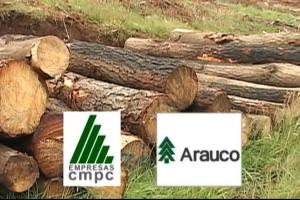The results of a research study carried out in different region, in 2010, by the Association of Forest Engineers for Native Forests were published last July. This Independent Forestry Monitoring led to a report on the environmental and social impacts caused by large scale tree plantations established by the company Anchile Ltda., and formal complaints were filed at the National Forestry Corporation (“Corporación Nacional Forestal” – CONAF), a body that is part of the Ministry of Agriculture.
Chile
Bulletin articles
30 September 2012
Bulletin articles
30 July 2012
In Chile, the onslaught of big forestry business groups backed by the state means more than 3 million hectares covered with industrial monocultures of pines and eucalyptus.
Bulletin articles
30 January 2012
The new year got off to a fiery start in Chile, as seen in the national and international news reports of the devastating forest fires raging across various regions of the country. These include the regions of Araucanía and Bío Bío, in central-southern Chile, where there are more than three million hectares of industrial plantations of exotic tree species. Over two million hectares of these plantations – primarily made up of pine and eucalyptus trees – are owned by the companies Arauco and Mininco, and have also been hit by the wildfires.
Other information
5 May 2011
What the big forestry companies have done with our territories in Chile is so devastating, so sad and so irreversible that it brings to the mind the “shock doctrine” described by Canadian author and activist Naomi Klein in her book of the same name (1).
Bulletin articles
28 February 2011
Since 1974, industrial monoculture tree plantations have spread throughout Chile, and are particularly concentrated in the regions of Bío-Bío and Araucanía, although they are also found in the regions of Maule, Los Ríos and Los Lagos.
Other information
29 June 2010
Tree plantations owned and operated by Forestal Valdivia S.A., a subsidiary of the Arauco group, have not only been granted certification by the Chilean sustainable forest management system CERTFOR (backed by the international Programme for the Endorsement of Forest Certification or PEFC label), but also chain of custody certification from the FSC (SGS-COC-005376).
Bulletin articles
27 February 2010
An article published in the newspaper “La Tercera”(1) and taken up on the Mapuche IMC blog (2) reveals the results of research carried out by scientists from Valdivia’s Austral University that link the presence of native forests with greater water production.
Other information
30 May 2009
In response to the global economic crisis that erupted late last year, Chilean President Michelle Bachelet has announced a series of measures to foster job creation and economic recovery. One of the most surprising measures is the decision to temporarily increase the subsidies granted to tree plantations under Decree Law 701.
Bulletin articles
27 September 2008
In Latin America, the Chilean case is presented as a successful forestry model, in spite of the fact that many Chilean organizations – in particular Mapuche indigenous organizations – have for years now been denouncing the impacts of large eucalyptus and pine plantations in southern Chile. However, this has not prevented well-paid forestry consultants from repeating the same lies and from convincing governments of other countries (Peru and Ecuador are the most recent cases), to follow the “successful” Chilean path.
Other information
1 August 2008
WRM information sheets on GE tree research
First posted: 1 August 2008
Last update: August 2014
Tree species being manipulated:
Pine (Pinus radiata)
Eucalyptus ( globulus)
Aim of genetic manipulation
Other information
24 July 2008
The occupation of the Mapuche peoples’ ancestral territories by large-scale eucalyptus and pine plantations belonging to major forestry companies such as CMPC and Forestal Bosques ARAUCO relies for its expansion on the support of State machinery. Repression, torture, death and criminalization of Mapuche resistance are the background for the “forestry model.”
The Mapuche conflict is a sort of leprosy in Chilean society: concealed, stigmatized and denied.




